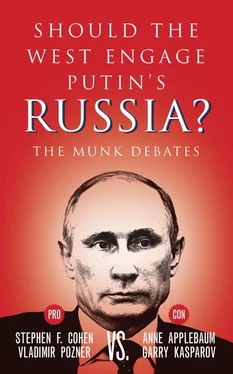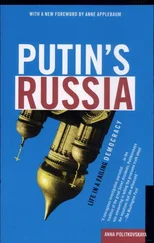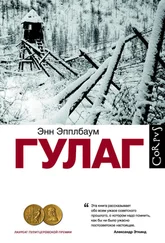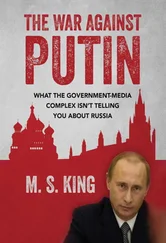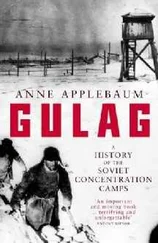When we talk about Putin’s friends, we are talking about people who were lucky. They shared the same desk with Putin at school or were in judo class with him, and now they are on the Forbes wealthiest list. As Anne said, the country is owned by very few families, and ironically, they are all people who are close to Mr. Putin. They are fighting for power, and it’s a fight for survival. The only item on Putin’s agenda is to stay in power, and he will keep it by whatever means necessary because he has no other choice. He will commit any crime to ensure he can stay in the Kremlin.
RUDYARD GRIFFITHS: Ladies and gentlemen, both sides of the debate have spoken. Now we want to get into an exchange between debaters. Vladimir, let’s start by asking you to pick up on something that Anne said. The Obama administration tried to roll back a number of policies that were seen as exclusionary to Russia. What did this famous reset do? It led to the conflict in Crimea and Ukraine. How do you respond to the perceived failure of that policy?
VLADIMIR POZNER: First of all, it did not. Secondly, Russia was so poor that they even misspelled the world “reset” in Russia. This policy did not lead to Crimea at all.
The bombardment of Yugoslavia is a perfect example of Russian humiliation; they begged us not to do it. And that was during Yeltsin’s time. The Russians were told to just shut up. And since the UN would not condone it, NATO led the mission. And then, of course, Kosovo was allowed to leave Serbia, although it had been a part of Serbia for over five hundred years.
Why was that possible? Why were the Russians ignored? This is the kind of humiliation that has led to the greatest anti-American sentiment in Russia that I have ever known, much more than during Soviet times. The average Russian today is absolutely anti-American, which was not the case before. There was anti-Bush, anti-Reagan sentiment, yes, but not anti-Americanism. This feeling is rooted in truth; it’s not just propaganda.
GARRY KASPAROV: No, there’s a lot of propaganda. My mother is seventy-eight. She was born and raised under Stalin. She said she has never heard such a concentrated message of hatred 24/7 on Russian television, like there is now.
VLADIMIR POZNER: Why are you yelling?
ANNE APPLEBAUM: That’s how he always talks.
GARRY KASPAROV: Because I am also Russian and I know Russia.
VLADIMIR POZNER: Oh, so Russians yell. That’s the idea, right? They also drink vodka, dance, and play the balalaika.
GARRY KASPAROV: I don’t drink.
VLADIMIR POZNER: Russians are normal people. Your mother has had her experience. I think I’m even older than your mother.
GARRY KASPAROV: Yes.
VLADIMIR POZNER: And I lived in the Soviet Union.
GARRY KASPAROV: But we lived on different sides of the fence. You were on the propaganda side; we were on the opposite side, listening to you.
VLADIMIR POZNER: No, that is not true. You don’t know anything about me. The propaganda in Russia was very different back then. It was far less sophisticated because Russia was totally isolated.
GARRY KASPAROV: You mean during the Soviet Union? Today it is more sophisticated. I agree.
VLADIMIR POZNER: Yes, today it is much more sophisticated. It is much more dangerous. I’m certainly not saying it isn’t, but the average Russian is also sadly more anti-American.
RUDYARD GRIFFITHS: Vladimir’s saying that the policy of isolation is stoking the anti-American sentiments that empower Putin and his ruling clique. Anne, why don’t you respond to that?
ANNE APPLEBAUM: We created Putin and his ruling clique. Our banking systems laundered their money and our tax havens protected it, so stop acting like they’re somehow a reaction to our isolation. We kept Putin on board. We invited him to the meetings and we tried to make him part of things. Initially, it was with very good intentions.
We wanted Putin to be part of the West. We had this idea that Russia was a candidate Western country and if we were just nice enough, they would join us. What we’ve discovered is that it has evolved into something really quite different. It’s not the Soviet Union. Soviet analogies are wrong. But it’s not Nazi Germany, either. It’s a very new, very sophisticated kind of propaganda-run state.
This is a country in which every single television channel and every single newspaper and almost every single Internet web site, with a few exceptions, is controlled by the state and run in such a way that they all appear to be slightly different. This is not one Pravda saying one thing every day. This is a wide spectrum of different media that all say the same thing using different perspectives and tones: the tabloid way, the sophisticated way, the entertaining way, or the news-focused way.
They’re telling people the same stories that Putin wants them to hear. And the story they’ve been telling for many months now is bitterly anti-American, bitterly anti-European, and coming very close to being warmongering in a way that I don’t remember.
The hatred toward Ukraine; the hatred toward Americans; the use of semi-fascist symbolism — this is something really, really new and different. No wonder people are anti-American.
RUDYARD GRIFFITHS: So is engagement nearly impossible because there isn’t a partner on the other side?
STEPHEN F. COHEN: Well, I’m having a hard time, because I tried to sign a contract with the audience whereby we would deal with some facts. I read ten Russian newspapers a day, and —
ANNE APPLEBAUM: How many Ukrainian newspapers do you read?
STEPHEN F. COHEN: I read ten Russian newspapers a day, across the spectrum. What Ms. Applebaum is describing is true in at least three of those ten — you hear the same story. But this is not the case in the other seven. There are at least three newspapers that are very pro-European, pro-American, and very critical of Putin.
What is astonishing for me to learn is that oligarchs and states launder money offshore. I had no idea such things happened in the world. I see a bigger problem in Russia because of the way this economic system formed in the 1990s. It absolutely has to be reformed.
Do I think it is Ms. Applebaum’s right to tell Russia or force Russia to do it? Absolutely not, because the result will be worse. This is for Russians to decide — not us. We need to decide if we need a Russian security partner in Russia, whether it is Putin or his successor.
And I would end with this point: I do not ever recall — and I’ve been around a long time — hearing people whom Ms. Applebaum and Mr. Kasparov represent speaking about a Soviet Communist leader in this way. In fact, when I listen to them, I have to say that there seems to be kind of a repressed nostalgia for the Soviet Union in their vendetta against Putin’s Russia.
ANNE APPLEBAUM: When you were giving your first introduction, Mr. Cohen, I wrote down “repressed Soviet nostalgia” on my notepad. You spoke with nostalgia of the days when the Soviet Union was still around and could help us regulate the world. This is what you dream of.
The Cold War era is something for which I have no nostalgia — half of Europe was enslaved during that period. Totalitarianism ruled hundreds of millions of people. You have this idea that if only the U.S. and Russia could work together once again we could create some kind of stability. Russia is not a country that wants stability. Russia is interested in chaos. It created chaos in Ukraine.
RUDYARD GRIFFITHS: Garry, let me bring you in here. Some would suggest that the recent Russia-Iran deal helped defuse that conflict. And some would say that Russia saved Obama’s proverbial bacon on his squiggly red line in Syria over chemical weapons. How do you respond to those examples of Russian co-operation?
Читать дальше
